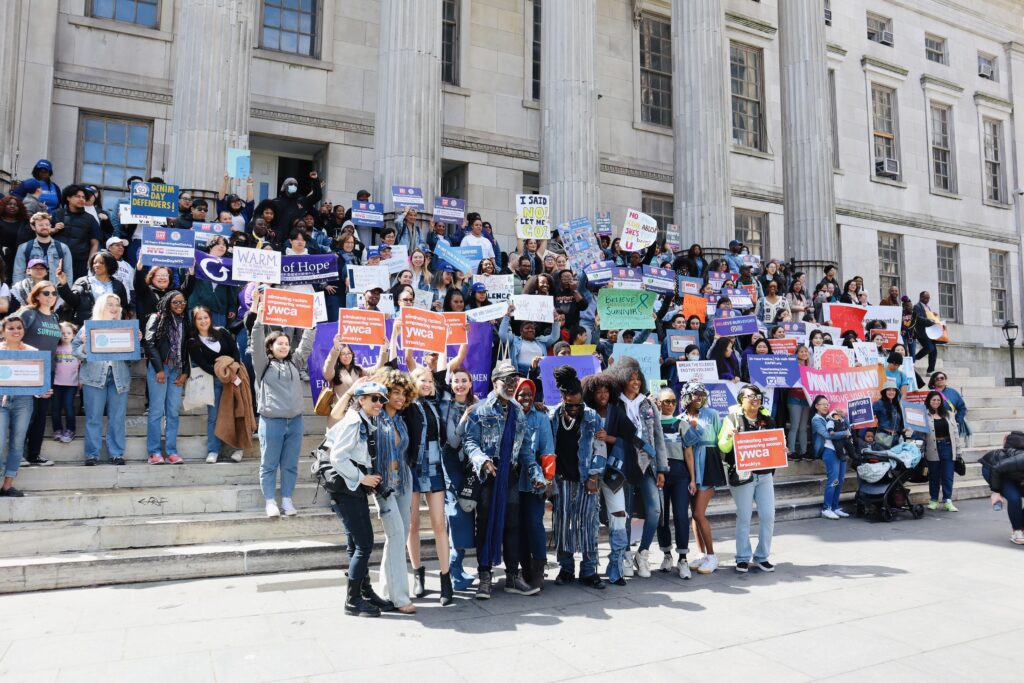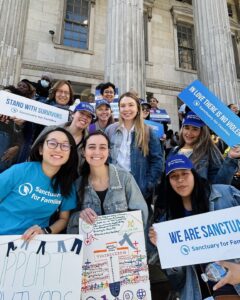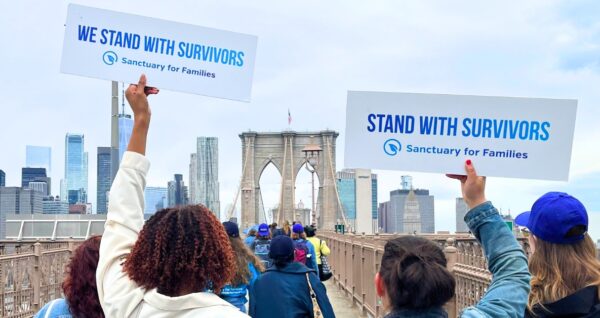Sanctuary for Families’ Pro Bono Project has the honor of working with hundreds of extremely dedicated and expert pro bono attorneys annually. As part of our Pro Bono Spotlight, we highlight some of the great work done by Sanctuary pro bono attorneys!
*Please note that this blog contains descriptions of abuse that could be triggering*
We first connected with Nicholas (“Nick”) A. Butto, Litigation Associate and member of the pro bono committee at Mintz, in November 2022. Since then, he has thrown himself into both coordinating pro bono partnerships between Mintz and Sanctuary and taking on a hefty caseload of pro bono matters himself. While Nick’s work has ranged from co-counseling with our Family Law attorneys on Orders of Protection and custody trials, to drafting motions, to representing survivors in their asylum claims, one through-line is constant: Nick’s undeniable dedication to assisting survivors in any way he can, with extraordinary efficacy and compassion. We are thrilled to highlight Nick for his incredible advocacy on behalf of survivors.
One of Nick’s first Sanctuary cases involved an Order of Protection litigation for Ms. L, a survivor of intimate partner violence that included verbal and emotional abuse, stalking, and severe physical abuse.
Lindsey Song, Associate Program Director of the Family Law Project, explains,
“Nick was able to get a 5-year OP on consent, which in itself can be very challenging as it requires the abuser to make significant admissions on the record. Nick is not only super competent, organized, and effective, he is also just so kind, lovely, and easy to talk to. It is clear how comfortable our client feels going to him with any concerns or questions!”
Lindsey adds that it’s evident that his passion for helping survivors runs deep; Nick worked in the Georgetown University Law Center Domestic Violence Clinic. Nick is currently working on another Order of Protection and custody trial with Lindsey, which he agreed to take on even though trial was set to begin shortly – he is now mid-trial in that case.
Nick has also worked closely with Erin Mears, Senior Staff Attorney of the Community Law Project, on a custody modification that originated as a Motion to Dismiss drafting project and is now in the final stages of settlement. Erin reflects, “Because he was so great I asked him if he had any interest to continue working on the case, and now he’s really taking the lead, with me in the backseat whenever he needs support. He’s just really willing and genuinely interested in doing the work, and connects incredibly well with the client. This client in particular had a lot of anxiety around her case, and Nick is always compassionate, willing to speak with her, and understanding.”
Erin also said,
“Out of all the pro bono attorneys I’ve worked with, he’s been one of the best with clients. This client is a survivor of sexual assault, and for her to feel so comfortable around a male attorney really says something. He seems to instinctually know how to connect with clients and seems really at ease with them. And you can see that the client feels very empowered having a strong attorney on her side.”
Nick has taken the lead on settlement negotiations and is close to securing a final resolution that the client is comfortable with.
To top it off, Nick is now also working on an asylum case with Immigration Project Associate Director Deirdre Stradone, who states, “I recently began to work with Nick on an asylum case in removal proceedings. Before I even had the opportunity to meet Nick, I was already hearing from my colleagues on other legal teams about his kindness, trauma-informed lawyering, and unwavering dedication to our clients. In the past few months as we have worked with Ms. N.C.S. on her asylum, I have seen for myself how Nick lives up to all these accolades. I am sure Ms. N.C.S. joins me in my expression of gratitude for all of Nick’s support. He is a truly amazing pro bono partner to SFF and I’m so happy to see him receive this recognition for his work.”
Sue Finnegan, Member and Chair of the Pro Bono Committee at Mintz, adds,
“Nick is so committed to his pro bono clients. His enthusiasm for the work has encouraged so many other attorneys in the New York Office to work with Sanctuary and its deserving clients.”
I sat down with Nick to hear more about his experience seeking out, coordinating, and conducting pro bono work on behalf of gender-based violence survivors.
What made you want to do pro bono work, and why work with gender violence survivors specifically?
I first became interested in being a lawyer to try to help amplify the voices of individuals who might find it difficult to access the justice system. I have been practicing for almost six years now—the last two at Mintz—and have been lucky to have access to a lot of resources that have allowed me to do that. As a law student, I participated in my school’s domestic violence clinic, and in practice, I have tried to take on a substantial pro bono caseload from early on in my career.
But with respect to gender-based violence survivors specifically, I so admire the work that the lawyers at organizations like Sanctuary do every day. Given how widespread of a problem intimate partner violence is, and how infrequently survivors are able to secure relief or protection from the justice system, I know it’s a constant uphill battle, and I just hope to be able to use the resources available to me to help survivors be heard, and ideally to feel that they and their families are safe from harm, like everyone deserves.
What has been your experience working with survivors predominantly in the Family Law arena?
Working on cases for survivors of intimate partner violence in Family Law definitely feels different than other cases—even than other pro bono cases. On one hand, helping a client achieve asylum, for example, ideally leads up to an amazing “victory” for the client and the legal team. On the other, working to secure Orders of Protection or other forms of relief for survivors of intimate partner violence does not have the same sort of victorious feeling, because you feel like this should never have happened in the first place. So even in “successful” cases, where we get the full Order we are seeking, the relief I feel for the client is often matched with frustration at the fact that our client had to endure such a long and difficult process just to achieve this basic form of safety and stability.
Sanctuary attorneys have glowing reviews of your trauma-informed, client-centered lawyering. How do you approach working with survivor populations?
I’ve now spoken with more than a dozen individuals who have suffered some sort of gender-based violence and I think that the initial conversations can be intimidating for everyone in the room, including the lawyers. The way I approach it is by listening first. So much of the power dynamic in abusive relationships leads to survivors not being heard: by their partner, by friends and family, by authorities. When you sit down with survivors, you hear how strong they are, how much they have to say, and how willing they are to fight for themselves given the right forum to do so. But it’s a process; you have to meet with clients a few times, because no one opens up 100% in the first meeting. So I try to establish trust, that what they’ve gone through is real, that it is their story to tell, and that we as lawyers are there to support them along the way.
What pro bono case stood out to you? Why?
One client I’m representing is currently in the midst of trial and seeking an order of protection. We’ve been through most of her direct examination at this point. I remember that in our first couple of meetings, she was hesitant about sharing certain parts of her story, and the thought of having to give details in court made her very nervous. But after numerous prep sessions and nearly two hours of testimony at her first day of trial, I have seen the sense of empowerment that telling her story has given her. In our latest prep meeting, she ended our conversation with, “I’m ready for this.” She has gained so much strength, and seeing that growth over the last year and a half has been amazing. She has an incredibly strong case but has been through a lot. It’s always tough to ask survivors to repeat and relive certain traumas but you can often see how valuable it is for them to be able to speak their whole truths.
Are there any cases you’re working on now that you’re excited about?
I’m now working on my first Sanctuary asylum case. Our team has met with the client three times now, and she just recently shared with us the part of her story about the trek from Honduras through Guatemala and Mexico to the US. We had heard about the violence she had both witnessed and endured herself, but hearing about the life-changing decision to leave, not because she wanted to, but because she knew it was the only way to have a chance at giving her children a future free of danger and fear, was really moving. Over the last 15 years she’s been through maybe more than any client I’ve worked with–from her community, gangs, intimate partners, and her own government—and for her to have the courage to make that incredibly difficult journey, with no guarantee of success and against significant odds, and make it to New York and find access to legal resources is so inspiring. No one deserves asylum more than she and her children do.
—
We are deeply grateful to Nick for his outstanding advocacy and commitment to serving survivors.








